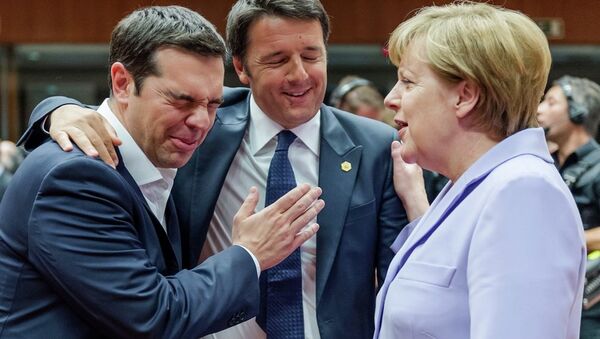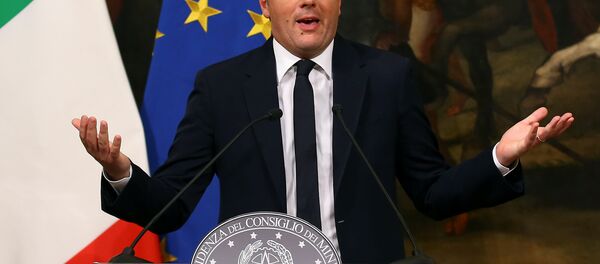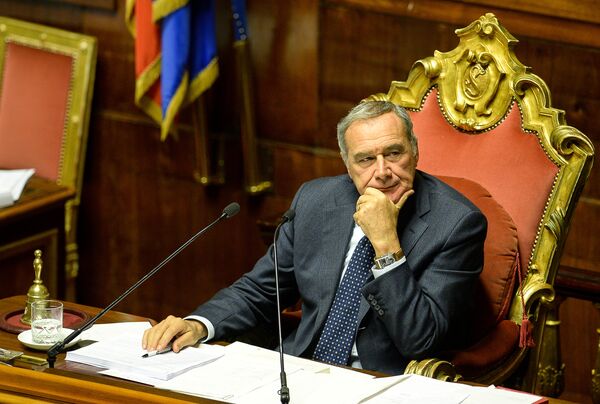Italy's current left-to-center majority, led by Renzi's own Partito Democratico (PD), has less than one and a half years left in office, its term running out by the end of February 2018.
The last general elections took place in February 2013, with the term lasting 5 years.
"A snap election is unlikely," Dr. Daniele Scalea, Italian analyst and general director of Istituto di Alti Studi in Geopolitica e Scienze Ausiliarie (IsAG), an independent geopolitical think tank, told Sputnik.
"President Mattarella prefers the current term to expire naturally, and Renzi's Partito Democratico (PD) has the numbers to form a new coalition. I expect an interim government weaker than Renzi's, but one that will run for the remaining, one year plus, term," Dr. Scale told Sputnik.
Candidates for the role are already being named in Italy. One, that of incumbent finance minister, professor of economics Pier Carlo Padoan, would reassure the financial markets, Brussels and the European Central Bank (ECB)," argues Dr. Scalea. "There is a high risk that a crisis will hit Italy's banking system by 2018", the time during which an interim government will operate.
A Greek Scenario?
The Italian Member of European Parliament Marco Zanni, of Beppe Grillo's Five Star Movement (M5S), told Sputnik that "European worries post-Renzi are fake and well orchestrated by the EU, whose B-plan for Italy is ready."
"We will see another Euro-induced banking crisis, within this seemingly perpetual euro crisis".
This would resemble a Greece 2.0 scenario, Zanni explains:
"The objective is clear, and has already been indicated by the European Commission, the European Central Bank, the Eurogroup and members of the German intelligentsia: to force Italy into receivership by the Troika".
If it seems a far-fetched scenario, the mechanisms to get there are very familiar:
"Receivership of Italy could be achieved in two ways. The ESM [European Stability Mechanism] might rescue those Italian banks that are under capitalised, and that failed last summer's stress tests. Or the European Central Bank might buy, under certain conditions, Italian sovereign bonds to reduce the spread — the difference in interest rate on public debt between Germany and Italy."
Of course neither 'help' mechanism comes for free. Nor do they help, as Greece shows.
And the conditions governments need to fulfil for the ESM or the European Central Bank to 'help' —all revolve around one of the most unpopular words of our time: austerity.
Tax-and-Cut Policies
Which brings us to the type of interim government Italian people would loathe most — a so-called "governo tecnico".
"It would lead to a popular revolt," says MEP Zanni.
In this post-Renzi scenario, president Mattarella would appoint experts rather than politicians as new ministers.
"But if the experts are an expression of strong powers, such as international creditors, we have to expect the same tax-and-cut policies we had with Monti's government," Dr. Scalea told Sputnik.
Indeed the record of Monti's 'governo tecnico', in office from November 2011 to April 2013, shows that such experts are often there to obey the EU's austerity diktat.
Best Solution for Renzi
Another type of interim government would be the so-called "governo del presidente".
Here, the President of the Italian Senate and Vice President of the Republic Pietro Grasso would take over from Renzi, in what would amount to an institutional solution, as opposed to either political or technical.
"It is a strong hypothesis, and it would play into Renzi's hands, with himself as party secretary and Grasso as premier, Renzi could influence the government while, at the same time, distance himself from it, if the need to do so arises," Dr. Scalea told Sputnik.
If it sounds Machiavellian, that's because it is.
But a Machiavellian play would still be preferable to yet another Greek tragedy.





